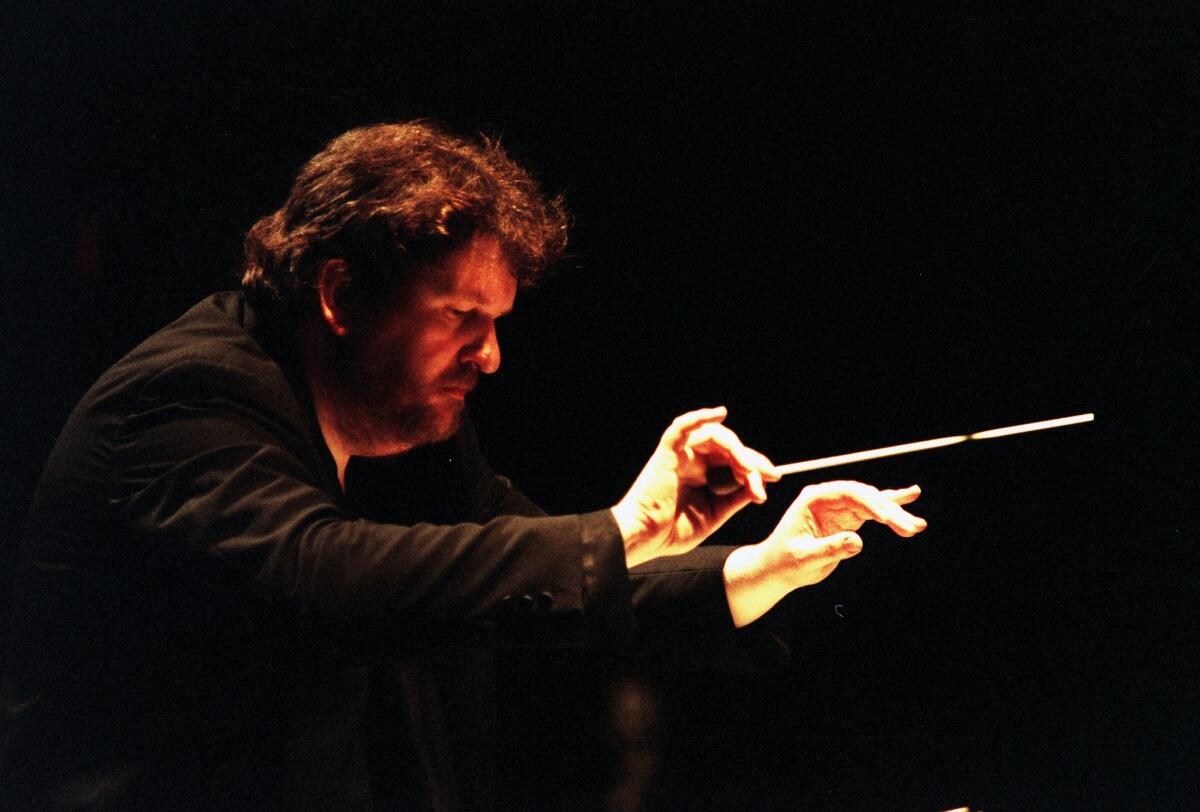Column: Europe concert diary: Harrison Birtwistle at the Proms

Harrison Birtwistle, who turned 80 in July, is being celebrated as England’s most imposing and probably greatest living composer at the Proms this summer and throughout Britain all year.
He is not, however, his country’s best loved composer. His music is strong, craggy, complex, mythic and modern at the same time, harshly hard to follow and just as harshly hard to forget. It grabs your ear and doesn’t let go.
Birtwistle’s big operas -- “The Mask of Orpheus”, “Gawain,” “The Second Mrs. Kong,” “The Last Supper” and most recently and most impressively, “The Minotaur” -- deal with primal subjects through deep, disturbing, profound music. None have been produced in the U.S., where Birtwistle’s music is seldom heard, even though “The Last Supper” was commissioned by the late Beverly Hills philanthropist Betty Freeman.
A Proms Birtwistle portrait concert Saturday afternoon was held not in the grand Royal Albert Hall but in an elegant chamber music venue, Cadogan Hall. It attracted a decent-sized audience, but the hall was not full. On a warm day, an outdoor market, the Saachi Gallery and high-end shops were mobbed.
But the program, which was conducted by composer Oliver Knussen and featured the Birmingham Contemporary Music Group, was an excellent example of what makes Birtwistle remarkable, while demonstrating why his music remains an outlier and hasn’t traveled well.
The reason is that it needs to be performed spectacularly and heard live in a resonant space. It doesn’t record well. Like witnessing the Grand Canyon, you simply have to be there.
Knussen went for what he called oldies but goodies, works written between 1968 and 1971, just as Birtwistle’s burly musical voice was becoming particularly robust. “Verses for Ensembles” begins with a roar, like a lion bursting out of its cage. Various instruments move around the stage at points during the 25-minute score as if to speak directly to the audience. You know what they mean without necessarily understanding what they are saying, which happens to be music’s greatest magic trick.
An even more effective work is “Meridian,” for contralto (the oracular Hilary Summers), a chorus of six sopranos (Exuadi) and a strangely constituted chamber orchestra.
On one side are three oboes (which switch to English horn), harp, percussion and solo cello. On the other are three clarinets (which switch to bass clarinet), harp, percussion and solo cello. The horn appears to control masculine energy; the cello, the feminine.
The texts are 15thcentury (Thomas Wyatt) and 20thcentury (Christopher Logue) and erotically charged. Again, it is very hard to know what Birtwistle is saying, but you have a pretty good idea of what is happening. Room is allowed for subdued, but not suppressed, violence.
Between these two extraordinary works was “Dinah and Nick’s Love Song,” a lovely six-minute fantasia for harp and three oboes written for the wedding of friends. It served as palate freshener.
Birtwistle has said that, as a conductor, Knussen can do no wrong. He did more than that here. The performances were, at every instant, magnificent.
What’s the chance of our hearing any Birtwistle soon? The last time the Los Angeles Philharmonic had a major Birtwistle piece on the program was in 1996, when Pierre Boulez conducted “Antiphonies,” with Mitsuko Uchida as piano soloist.
But that could change. This spring Gustavo Dudamel conducted Mahler’s Third Symphony with the Berlin Philharmonic and the program began, beguilingly, with “Dinah and Nick.”
Los Angeles Opera’s Christopher Koelsch has expressed interest in bringing “Minotaur” to the Music Center. That won’t be an easy sell, but it could make a splash felt across the continent.
Music Critic Mark Swed is in Europe for this week to attend some important musical events. He will be sharing his experiences -- as well as his criticism -- with Culture Monster readers.
More to Read
The biggest entertainment stories
Get our big stories about Hollywood, film, television, music, arts, culture and more right in your inbox as soon as they publish.
You may occasionally receive promotional content from the Los Angeles Times.











